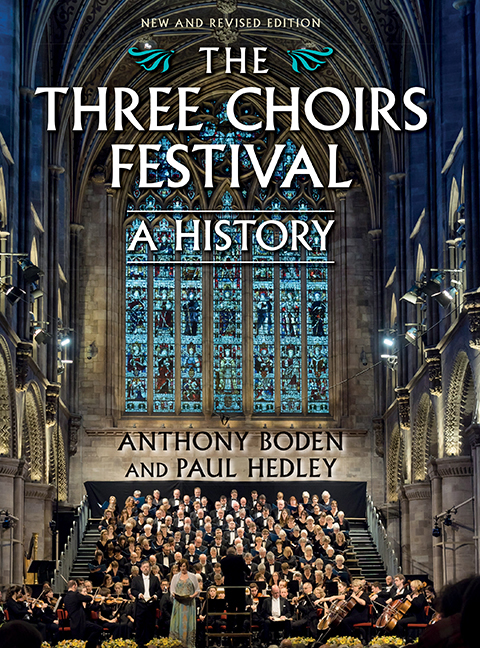Book contents
- Frontmatter
- Contents
- List of Illustrations
- Preface
- Acknowledgements
- List of Abbreviations
- List of Cathedral Organists
- 1 Origins
- 2 A Fortuitous and Friendly Proposal
- 3 A Numerous Appearance of Gentry
- 4 ‘The Musick of my Admiration Handel’
- 5 The Gentlemen and the Players
- 6 Avoiding Shipwreck
- 7 Prima voce
- 8 Favourites and Flops
- 9 Sacred and Profane
- 10 Froissart
- 11 The Unreasonable Man
- 12 The Dream
- 13 Beyond these Voices
- 14 An Essentially English Institution
- 15 The Elgar Festivals
- 16 Dona nobis pacem
- 17 Recovery
- 18 Association
- 19 A New Epoch
- 20 Jubilee
- 21 Theme with Variations
- 22 Houses of the Mind
- 23 ‘A Gold-Plated Orchestra’
- 24 A New Millennium
- 25 Reorganisation
- 26 An Invitation to the Palace
- Appendix Three Choirs Festival Timeline
- Select Bibliography
- Index
- Plate section
12 - The Dream
Published online by Cambridge University Press: 11 August 2017
- Frontmatter
- Contents
- List of Illustrations
- Preface
- Acknowledgements
- List of Abbreviations
- List of Cathedral Organists
- 1 Origins
- 2 A Fortuitous and Friendly Proposal
- 3 A Numerous Appearance of Gentry
- 4 ‘The Musick of my Admiration Handel’
- 5 The Gentlemen and the Players
- 6 Avoiding Shipwreck
- 7 Prima voce
- 8 Favourites and Flops
- 9 Sacred and Profane
- 10 Froissart
- 11 The Unreasonable Man
- 12 The Dream
- 13 Beyond these Voices
- 14 An Essentially English Institution
- 15 The Elgar Festivals
- 16 Dona nobis pacem
- 17 Recovery
- 18 Association
- 19 A New Epoch
- 20 Jubilee
- 21 Theme with Variations
- 22 Houses of the Mind
- 23 ‘A Gold-Plated Orchestra’
- 24 A New Millennium
- 25 Reorganisation
- 26 An Invitation to the Palace
- Appendix Three Choirs Festival Timeline
- Select Bibliography
- Index
- Plate section
Summary
AT Hereford in 1897 Sinclair broke with the tradition of an Opening Service and sermon on the Tuesday morning, and followed instead the example set by Worcester in 1881. An ‘immense congregation’ was present to hear the Festival Chorus, orchestra and some of the principal soloists take part in a special Opening Service on Sunday morning, 12 September. The music was magnificent. At Sinclair's request Elgar had composed a Te Deum and Benedictus especially for the occasion, pieces instantly recognised by the critics as masterpieces of their kind. Also performed were Schubert's Symphony No. 8 in B minor (Unfinished); ‘How lovely is Thy dwelling-place’ from Brahms's German Requiem; Elgar's Imperial March; and the ‘Hallelujah’ chorus from Beethoven's Mount of Olives. Here was a blazing fanfare to herald not only a celebration for the Diamond Jubilee of a queen, but also the beginning of a new era for Three Choirs.
For the first time at Hereford, the chorus was drawn entirely from the Three Choirs cities. Sinclair, with customary energy and commitment, arranged combined rehearsals for months in advance. Highlights of the Festival included a new Magnificat by Parry; the Good Friday music and the Finale to the first act of Wagner's Parsifal, with Lloyd Chandos and Harry Plunket Greene; the Symphony No. 6 in B minor (Pathétique) by Tchaikovsky; and Beethoven's Missa solemnis with Emma Albani, Hilda Wilson, Edward Lloyd and Watkin Mills – ‘Rarely has that difficult music been attacked with greater spirit or more signal success.’
Named in the programme for the first time in 1897 were the newly appointed Organists of Gloucester and Worcester: Herbert Brewer and Ivor Atkins. There, too, was Sinclair's eighteen-year-old Assistant Organist, Percy Hull, who had been present at Sinclair's house on 5 June 1897 when Elgar had taken over his manuscript of the Te Deum and Benedictus:
I was privileged to hear Elgar play over his Festival Te Deum and Benedictus in Sinclair's house to see whether the work would be acceptable for the programme of the Festival at Hereford … He was as nervous as a kitten and heaved a huge sigh of relief when Sinclair said: ‘It is very very modern, but I think it will do; you shall play it again after supper when Hull and I will give you our final verdict.’
- Type
- Chapter
- Information
- The Three Choirs Festival: A HistoryNew and Revised Edition, pp. 161 - 178Publisher: Boydell & BrewerPrint publication year: 2017

